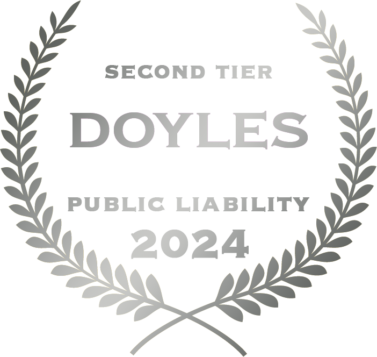
TPD Claims – Your Complete Guide.
A TPD claim can provide you with a life-changing lump sum payout if you’ve had to stop working because of an illness or injury.
But just because you qualify for a TPD claim doesn’t mean your claim will be a simple process. What many people fail to understand is that you also need to complete a thorough application that clearly shows why you qualify. As a result, a lot of valid TPD claims get rejected by insurers or are abandoned because the process becomes too difficult.*
We’ve helped thousands of Australians with their TPD claims. In this article, we’ve summarised everything you need to know about TPD claims, including advice on how to make a successful claim, examples of claims, and expert tips from our TPD lawyers and specialists.
*ASIC Report REP 633: Holes in the safety net (current as of June 2024)
TPD claims – what you need to know.
Clients who come to us for help with their TPD claims are usually in one of the following four situations:
It can be hard to understand the terms of your policy, but you must demonstrate how you meet those terms in your application. This is covered in detail in this article.
Claims are often rejected on the basis that the applicant doesn’t meet the criteria in the policy. However, in our experience, missing or incomplete information can be a major factor in these rejections.
Many people abandon their claims when the process becomes too difficult. In this article, we explain how you can speed up the approval process and increase your chances of success.
If your claim has been rejected, it’s still possible to challenge the insurer’s decision. Read on to learn more.
TPD claim expert tip: If you have more than one TPD policy, you may be able to make multiple TPD claims – one for each policy. This is quite a common situation, as many people have multiple superannuation funds as a result of changing jobs over the years and may have a TPD policy through each fund.
TPD claim story – Mary’s $1M payout for policies she didn’t know she had.
Most Australians have TPD insurance included in their superannuation, although many are unaware they’re covered. At the end of this article, we’ve included the story of a NSW single mum who came to us with a box of unopened superannuation statements and ended up with a life-changing payout.
Quick Links:
- Making a TPD claim
- TPD claim process – 7 steps to a successful claim
- TPD claim payouts
- TPD claim story – Mary’s $1M payout
What is a TPD claim?
If you’re unable to work due to injury or illness, you may be entitled to make a TPD claim through your super fund. When you make a TPD claim you’re claiming a lump sum on top of your superannuation fund balance. Many Australians are unaware they’re entitled to this lump sum, but it can be a real lifeline if you’ve had to stop working.
TPD stands for total and permanent disability. A total and permanent disability insurance policy provides you with a lump sum payment if you can’t work due to an injury or illness. If you have superannuation, it’s likely you have TPD insurance, although many Australians are unaware they’re covered.
Here are three questions that will help you understand if you’re eligible:
- Has an illness or injury stopped you from working for three or more months?
- Does it look like you won’t be able to return to work?
- Do you have superannuation?
If you answered yes to these questions, then you may be eligible to make a TPD claim. Different policies have different provisions and definitions, but this article explains how to find out if you qualify to make a TPD claim.
With some TPD claims in Australia, you don’t necessarily have to be unfit for all work to make a successful claim.
It all depends on the definition of TPD in your policy. It might cover you for:
- Being unlikely to be able to return to work in your occupation
- Being unlikely to be able to return to work in any occupation
Our specialist TPD lawyers can look at your superannuation fund (or funds) and advise you about your TPD entitlements. We provide free advice over the phone, so it’s worth calling to find out what you can claim.

How do you claim TPD?
A lot of people who submit their own TPD claims end up abandoning their claims when the process becomes too complicated*. However, there are steps you can take to help you make a successful TPD claim – these are listed in the seven steps section of this article.
TPD claim expert tip: The key to successful TPD claims is completing the application thoroughly and providing all the necessary documents, such as medical records or workers compensation files, to substantiate your claim. However, since most people have never lodged a TPD claim before, they end up in a position where they’re simply responding to ad-hoc requests from the superannuation provider or the insurer, which can be a lengthy and frustrating process. If you make even one error during this process it can seriously jeopardise the success of your claim.
This is why many people use one of our specialist Sydney TPD lawyers to manage their TPD super claims on their behalf. At Law Partners, we have a team of TPD specialists who can handle your claim for you on a no win no fee basis, so you only need to pay us after you receive your lump sum.
*ASIC Report REP 633: Holes in the safety net (current as of June 2024)
Why would a TPD claim be denied?
In our experience, the common reasons for insurers rejecting TPD insurance claims include:
- A dispute over the evidence you’ve provided
- Not providing evidence that you meet the definition of disability in your policy
- Lodging your claim too late
- Your policy becoming inactive – this may be because you closed your account or the account has been inactive for some time
- Applying before the minimum waiting period
- Not meeting work history requirements
- Not meeting age restrictions
If your TPD claim has been rejected, you might still be able to get the insurer’s decision reversed. For example, if your TPD claim was rejected because it was lodged too late, there might be circumstances beyond your control that caused the delay. Speak to one of our Sydney or Melbourne TPD lawyers to find out your options and whether you can get the insurer to reverse its decision.
What injuries and illnesses qualify for a TPD claim?
Here are a few examples of injuries, Illnesses, and mental health conditions that can prevent people from working and might qualify for a TPD claim.
- Carpal Tunnel
- Back injuries resulting in spinal fusions
- Brain injuries
- Loss of speech
- Loss of hearing
- Loss of the use of a limb
- Paraplegia
- Quadriplegia
- Cancer
- Motor Neurone Disease
- Multiple Sclerosis
- Muscular Dystrophy
- Dementia
- Alzheimer’s Disease
- Parkinson’s Disease
- Chronic Lung Disease
- Severe Rheumatoid Arthritis
- Cardiomyopathy
- Primary Pulmonary Hypertension
- Anxiety
- Depression
- Post-Traumatic Stress Disorder (PTSD)
- Schizophrenia
- Bipolar Disorder
The examples listed above can be used as a general guide. However, you’ll need to check the criteria in your TPD insurance policy to understand what you can claim for.
Call 13 15 15 or chat to us now for free advice
Chat nowFind out how much you can claim.
Get started
TPD claim process: the seven steps to a successful claim.
The first step is to identify all your TPD policies. Many people have multiple super funds from having had multiple jobs over the years. If you have multiple super funds, then you might have multiple TPD policies you can make TPD claims against. Your member statements will indicate what insurance cover is included with each fund, so start by gathering the statements and make a list of which of your super funds have TPD policies.
TPD claims advice tip: If you’ve lost your statements or you’re not sure what insurance is included, you can call 13 15 15 for help. We can contact your super funds for you and help you work out what you’re entitled to.
To make a TPD claim your policy will need to have been valid at the time you became injured or ill. This can be a grey area, as some illnesses and injuries develop over time. So if you’re unsure, think about the date you first became aware of your injury or illness. Then look at which of your TPD policies were valid at that time.
Read through the terms of your TPD policy (or policies) to understand what qualifies for a lump sum payout. For example, your TPD policy might cover you for:
- Being unlikely to be able to return to work in your occupation
- Being unlikely to be able to return to work in any occupation
Expert tip: With some TPD policies in Australia, you don’t necessarily have to be unfit for all work to make a successful TPD claim.
This is the most important TPD claim advice we can give you. Many people simply complete the application forms and assume their claims will be approved. But if you do that and fail to supply all the evidence needed to support your TPD claim, it’s likely the insurer will simply keep asking you for more information and the process can really drag on. This is why many people who handle their own TPD claims end up failing to get the TPD payout they’re entitled to – they simply give up out of frustration.
Our TPD claim specialists can compile all the evidence and submit your claim for you so that the insurer has all the information they need and you’re more likely to get your TPD claim approved.
This is also essential TPD claim advice and a key part of a successful TPD claim, but something that’s often overlooked by people who have their TPD claims rejected. A well-written submission will clearly state how your situation satisfies the criteria in your TPD policy. Our TPD specialists write literally hundreds of these submissions every year. When insurers see well-written applications, they know they’re dealing with claims that have been professionally prepared and are highly likely to be valid claims.
TPD claims advice tip: A poorly prepared submission or application may be seen by the insurer as an indicator that the claim may not be valid.
Being proactive will help avoid unnecessary delays and frustration in making a TPD claim. Don’t assume that the insurer will tell you immediately if anything is missing or not filled out correctly – follow up with the claim assessor to check on the status of your claim, and make sure they have everything they need from you.
If your TPD claim is denied don’t assume that’s the end of the matter – there are options available to dispute insurers’ decisions. Our TPD specialists have made successful TPD claims on behalf of many clients who originally submitted their own claims and had them denied.
How long do TPD claims take?
It usually takes 6-12 months for a TPD claim to be finalised.
Insurance companies generally assess TPD claims within six months. Some straightforward claims are finalised sooner, however with more complicated claims insurance companies often take longer than six months to make a decision.
Once the insurance company has made its decision on a TPD claim, the trustee of the superannuation fund must make their own separate assessment. This process usually takes between one and two months.
TPD claim expert tip: the key to getting your claim processed as quickly as possible, is to submit a thorough, well-prepared claim to the insurer. If your application misses any details needed by the insurer, you’ll find yourself going back and forth with them and it can really drag on.
A Law Partners TPD claim specialist can make sure your claim is processed in the shortest possible time frame, by submitting a thorough, professionally prepared claim to the insurer on your behalf.
Can you make multiple TPD claims at once?
Yes – if you have more than one TPD policy, you may be able to make multiple TPD claims – one for each policy. You may have multiple superannuation funds from changing jobs over the years, with a TPD policy included in each fund. Making a successful TPD insurance claim against one policy has no effect on any other TPD insurance you may have, but you’ll need to submit a separate claim against each policy.
Getting help with your TPD claim.
To make the claim process a lot easier and increase the likelihood of a positive result, many people use one of our TPD specialists to manage their claims for them.
In our experience, the key to making a successful TPD claim is completing a thorough application and providing all the necessary documents. The written submission explaining why your claim should be approved is also important. Our TPD lawyers and specialists have submitted hundreds of claims and know exactly what needs to be done to get your claim approved.
We can also check your superannuation funds and find out what cover you have. If you have multiple superannuation funds, they can help you make multiple TPD claims.
Other things you should consider include:
- Time limits for TPD claims
- Minimum wait periods
- Whether you meet work history requirements
- Your age
- Your evidence and whether it’s good enough
- Any exclusions or eligibility clauses in your TPD insurance policy
These are all things that a Law Partners TPD specialist can help you with, to give you the best possible chance of a successful TPD claim.
Call 13 15 15 or chat to us now for free advice
Chat nowFind out how much you can claim.
Get started
How much is a typical TPD payout from a superannuation fund?
TPD payout amounts typically range between $60,000 and $300,000, with many payouts being over $200,000. You can find your insured benefit amount on your superannuation member statement if it has an attached TPD policy.
If you make a successful TPD claim, you’ll generally be given the option to withdraw this lump sum from your superannuation account together with your existing superannuation account balance. For more information, read our guide to superannuation TPD payouts.
Is a TPD payout considered taxable income?
A TPD payout isn’t classed as taxable income, but if you withdraw any part of your TPD payout from your super fund as a lump sum, you’ll have to pay “superannuation lump sum withdrawal tax”. The amount payable is different for everyone, and if you have multiple super funds, the amount will be different for each fund you make a withdrawal from.
- There’s no tax payable if you’re aged 60 or over.
- If you’re under 60, the amount of tax you’ll pay depends on your age and your “eligible service date” (usually the date you became a member of your superannuation fund).
- If you haven’t reached your preservation age, then some of the withdrawal amount will be tax-free, and some will be taxed at 22%.
- If you have reached your preservation age (but you’re not yet 60), you can withdraw up to $225,000 tax-free.
- If you withdraw more than this amount, a portion of the additional amount will be tax-free, and the taxable portion will be taxed at 22%.
Do TPD payouts affect Centrelink?
A TPD claim payout has no impact on your Centrelink or other benefits (such as child support payments), because the lump sum is paid into your superannuation account. Superannuation is excluded from Centrelink means testing if you’re under the Centrelink Age Pension age.
However, if you withdraw any part of your TPD payout (or any part of your existing superannuation) balance, it may impact your Centrelink entitlements. Different Centrelink benefits are means-tested in different ways, so it’s a good idea to get professional financial advice on your entitlements before you access your TPD lump sum or superannuation account balance.
Mary’s $1M TPD claim.
Mary was diagnosed with MS in 2015. Overnight her life became all about hospital visits and specialist appointments. But when she reached the point where she couldn’t work, Mary was suddenly faced with the reality of her financial future – and as a single mum with two kids, it looked pretty bleak.
It was Mary’s sister who asked if she had TPD cover through her super. She’d never heard of TPD and had to look it up – and to complicate matters, she had multiple super policies. Mary had a box full of ten years of unopened mail from her super funds and was daunted by the prospect of going through them to work out what cover she had.
Mary saw an ad for Law Partners when she was Googling TPD so she called us and we took it from there. We went through her super statements and worked out Mary had five TPD policies. We got her a total payout of over $1 million, which has been life-changing for Mary and her children.
For more stories, read our article on TPD Claim Stories.
Whether you’re ready to make a claim, having trouble getting your claim approved, or just considering your options, there’s no cost to speak to a TPD lawyer at Law Partners. We’d be happy to answer your questions on anything related to TPD claims.

Gillian Potts
Special Counsel
An accredited specialist in personal injury law with expertise across medical negligence, public liability and motor accident compensation claims, in a career spanning the best part of two decades.
Related articles.
Do I have a case?
Our senior lawyers will assess your case for free.



















